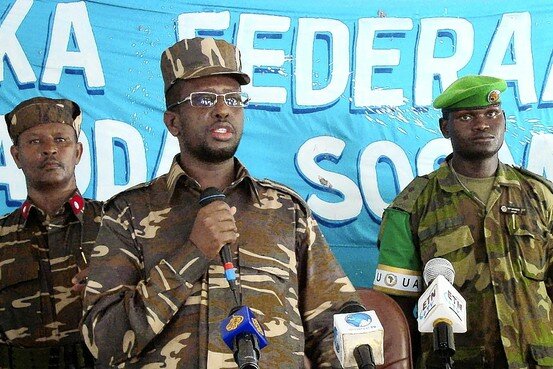Somali Leader Says Nation Needs More Support

By SARAH CHILDRESS — NAIROBI, Kenya—The president of Somalia warned that his country lacks the international support it needs to thwart insurgents who are trying to overthrow his government, as al Qaeda attempts to secure its foothold in the horn of Africa.
In an interview, Somali President Sheikh Sharif Sheikh Ahmed said his government controls only parts of Mogadishu, the capital. Al Shabaab and other militant groups have overrun much of southern Somalia, despite the U.S. and other Western governments’ viewing Somalia as a key battleground against al Qaeda in Africa and despite pledging their assistance.
“The problem faced by Somalia now is not one that can be dealt with by the Somalis alone,” said President Sharif, speaking from a hotel suite during a visit to Nairobi. “The support we get is much less than what we anticipated, and than what we need. [Somalia] is a country that is destroyed, that has the presence of al Qaeda, that needs a comprehensive plan.”
Somali government troops have struggled to fend off the militants. The government-backed forces are known to be underpaid and not sufficiently trained, but Mr. Sharif said that the condition of his troops had improved and that reported incidents of some selling weapons to militants for food were “not that common.”
The Somali government needs a strong security force to reclaim the country and maintain stability. Powerful militant groups have united to overthrow the government. In the most recent attack, three ministers and several civilians were killed last month when a suicide bomber attacked a graduation ceremony.
For now, the government relies mainly on the African Union peacekeeping forces to secure parts of Mogadishu and to protect the international airport.
The shaky security situation is part of a grim overall picture for a government that has little to show for itself after one year in power, other than its own survival. Mr. Sharif said he blamed the lack of progress on the influx of foreign fighters who have undermined plans to stabilize war-torn Somalia, and on a lack of support from the international community.
The U.S., a major supporter of the government, has provided funding to the government as well as helped to train its forces. The U.S. hasn’t said whether it would increase its support this year. According to the most recent figures available from the African Union, the international community by October had delivered only $39 million of the $200 million pledged at a donor’s conference in Brussels last year.
“What was not in our calculation at the time is that the enemy prepared itself and wanted to bring down this government before it could stand on its own feet,” he said. “I’m glad to report that we have been able to remain in place and defend ourselves from this.”
The attempted Dec. 25 bombing of a U.S. airline by a Nigerian national, for which al Qaeda has claimed responsibility, offers a reminder of how al Qaeda appears to view Africa not just as a potential recruiting pool, but also as a place from where it can establish a base to launch attacks on Western targets. Somalia’s weak government offers one such potential staging ground. Al Qaeda has taken similar advantage of Yemen, a troubled country across the Gulf of Aden from Somalia.
The president said the foreign fighters—from countries such as Yemen and Pakistan—have taken a leadership role among Al Shabaab, a homegrown extremist group. They offer training and technical advice to improve the sophistication of the militants’ attacks, and they help plan the groups’ combat strategies, he said. Some Shabaab fighters, he said, have also been sent to train with al Qaeda in Afghanistan.
Mr. Sharif, who wore a Muslim prayer hat and a gray suit with a Somali flag pin, emerged as a moderate voice in the Union of Islamic Courts, an Islamist government that took control of Somalia briefly in June 2006. That government was overthrown by Ethiopia six months later. Mr. Sharif returned to power in January 2009 after he was elected president by the parliament. The U.S. and other Western governments regard the slight, softspoken former schoolteacher, who is in his mid-forties, as their best bet for delivering a degree of stability to a country that has seen little of it for nearly two decades.
Since the fall of Somali dictator Siad Barre in 1991, the east African nation been dominated by clans with shifting alliances. In that power vacuum, Somalia has become a haven for extremist groups, and more recently, piracy.
In the past year, piracy has become a more sophisticated business, giving rise to entire towns along the Somali coast that thrive on a ransom economy. While pirates continue to attack ships on the Gulf of Aden, a high-traffic shipping route, recently they have become capable of attacking farther out in the Arabian Sea and down the Somali coast, in the Indian Ocean. The government had hoped to offer jobs and other opportunities for these men to lure them from piracy, but so far doesn’t have the capacity to do so.
“So long as there’s no peace and security in Somalia, it is hard to deal with the issue of piracy,” Mr. Sharif said. “Every time they get large ransoms, they reinforce their capacity to do harm. That’s the challenge.”
______
Source: Wall Street Journal
Comments
comments
 Calendar
Calendar






































